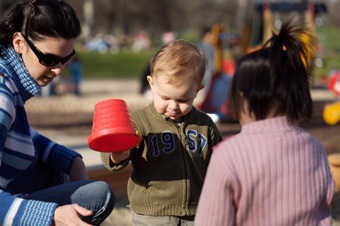Different Types of Play for Toddlers 12-36 Months

Encouraging play supports every aspect of your toddler's growth and development - helping to build new physical, emotional, social, cognitive and language skills. Different types of play have different roles in child development.
Here's a quick overview.
There are five disctinctly different types of play.
- Solitary Play: This is when your toddler plays alone. All children like solitary play at times.
- Parallel Play: This is when your toddler plays beside another child without interacting. Your toddler will observe the other child and often imitate what they do. Toddlers enjoy parallel play.
- Imitative Play: This is when your toddler and another child copy each other. One toddler starts to jump and soon they are both jumping. Or you are folding clothes and your toddler tries to do the same.
- Social Bids: This is the first step toward having fun with others. Well before the age of 24 months, your toddler will offer toys, looks, or words to other children. It’s your toddler’s way of communicating.
- Cooperative Play: As your toddler gets older, he or she will start to play with other children. They may work together to build a block village or take stuffed animals to the doctor. Many children are not ready for this kind of play until they are 36 months of age or older.
Resources & Links:
HealthLink BC: Your Child and Play, From Birth to Three Years
-
Three to Six Years: Dietary and Developmental HighlightsAround three, children become increasingly social, more independent, and even more fun to be with than they were before. Preschoolers are particularly playful people who can be quite jovial and
-
It’s tough to talk about money, even when the discussion is with someone mature and rationale. When it comes to teaching your kids about finances—in particular, what’s a “want” and what’s a “need”—it can be even tougher. It’s not easy to explain t
-
All children make grammatical errors when they are first learning how to talk. Most of these mistakes are not random, because they happen in predictable developmental stages. Some errors are actually essential to the process of learning. Others can b


